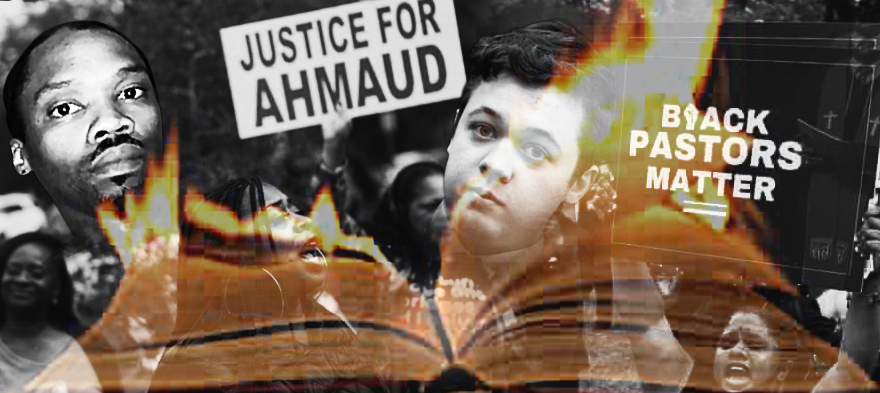
Nov 22, 2021 12:00:00 AM
In the words of Mugatu, I feel like I’m taking crazy pills.
Defense lawyers in the trial seeking justice for the murder of Ahmaud Arbery, apparently seeking to distract from the modern-day lynching committed by their defendants, repeatedly brought up the fact that Rev. Jesse Jackson was in the courtroom, unashamedly stating, “we don’t want any more Black pastors coming in here.”
In the very same news cycle, Kyle Rittenhouse was found not guilty of the shooting of three, and murdering of one; nevermind the fact that it was he who chose to travel across state lines with an assault rifle, violate a curfew, lie about being an EMT, and pose for pictures with white supremacists.
Meanwhile, again in the very same news cycle, Julius Jones, a Black man wrongly imprisoned since 1999 for a murder that mounting evidence says he did not commit, was spared a wrongful execution at the last minute, thanks in part to the millions of voices calling for commuting of the sentence.
And, finally, again in the very same news cycle, school systems across the country are contemplating banning, and in some cases burning, books such as Nobel Laureate Toni Morrison’s "Beloved," and "The Bluest Eye," August Wilson’s Pulitzer Prize-winning play “Fences,” as well as any materials with “terms and concepts” such as “woke,” “whiteness,” “white supremacy,” “structural bias,” “structural racism,” “systemic bias” and “systemic racism.”
So, to recap, in one news cycle we have:
So, yeah, I feel like I’m taking crazy pills.
Perhaps the most ironic aspect of all of this is the fact that the (I’ll just say it) [pullquote]racists who fight against whatever they think critical race theory is, are proving the very thing they are trying to discredit; that racism is, remains, and always has been, a central structure in American society.[/pullquote]
As just one example, America’s inequitable school funding formulas are based upon the alignment of local property tax wealth to local school budgets. The higher the tax wealth, the greater resourced the school system. The result is a pattern of wealthy communities enjoying fully resourced schools while neighborhoods of poverty are left with under-resourced schools.
Real estate plays the role of segregator, thereby connecting systemic educational inequity with systemic residential inequity.
The two systems work together to create a self-perpetuating cycle, an unjust feedback loop: residential communities segregated by race and class means communities of color have the greatest amount of poverty, which means lower property tax value, which means under-resourced schools, which means less access and opportunity, which means lower lifetime income, which means living in a poorer community, which means having under-resourced schools, etc. etc. etc.
It is therefore perhaps not surprising that a USA Today/Ipsos poll found that a majority of Republicans did not agree with teaching about the ongoing effects of slavery; just 38% supported doing so and school systems in Pensylvania, Texas, Tennessee, Wyoming, and Virginia have seen movements to ban, and in Virginia’s case, burn books.
This brings to mind a warning from Europe 100 years ago, [pullquote]“Where they burn books, they will also ultimately burn people.”[/pullquote]
All of this from one news cycle.
Zachary Wright is an assistant professor of practice at Relay Graduate School of Education, serving Philadelphia and Camden, and a communications activist at Education Post. Prior, he was the twelfth-grade world literature and Advanced Placement literature teacher at Mastery Charter School's Shoemaker Campus, where he taught students for eight years—including the school's first eight graduating classes. Wright was a national finalist for the 2018 U.S. Department of Education's School Ambassador Fellowship, and he was named Philadelphia's Outstanding Teacher of the Year in 2013. During his more than 10 years in Philadelphia classrooms, Wright created a relationship between Philadelphia's Mastery Schools and the University of Vermont that led to the granting of near-full-ride college scholarships for underrepresented students. And he participated in the fight for equitable education funding by testifying before Philadelphia's Board of Education and in the Pennsylvania State Capitol rotunda. Wright has been recruited by Facebook and Edutopia to speak on digital education. In the wake of the COVID-19 pandemic, he organized demonstrations to close the digital divide. His writing has been published by The Philadelphia Inquirer, The Philadelphia Citizen, Chalkbeat, Education Leadership, and numerous education blogs. Wright lives in Collingswood, New Jersey, with his wife and two sons. Read more about Wright's work and pick up a copy of his new book, " Dismantling A Broken System; Actions to Close the Equity, Justice, and Opportunity Gaps in American Education"—now available for pre-order!
Few issues in education spark more tension and debate than standardized testing. Are they a tool for equity or a burden on students? A necessary check on school systems or a flawed measure of...
Charter schools are public schools with a purpose. Operating independently from traditional school districts, they're tuition-free, open to all students, and publicly funded—but with more flexibility...
Despite the benefits of a diverse teaching force, prospective teachers of color fall out of our leaky preparation pipeline at every stage: preparation, hiring, induction, and retention. Here’s what...
Ed Post is the flagship website platform of brightbeam, a 501(c3) network of education activists and influencers demanding a better education and a brighter future for every child.
© 2020-2025 brightbeam. All rights reserved.
Leave a Comment